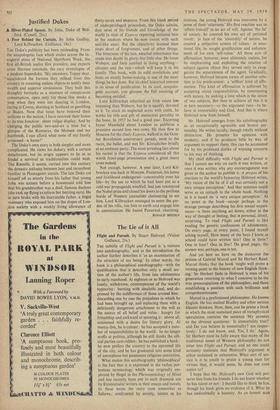Justified Dukes
A Silver-Plated Spoon. By John, Duke of Bed- ford. (Cassell, 21s.)
A Peer Behind the Curtain. By John Godley, Lord Kilbracken. (Gollancz, 18s.)
THE Duke's publicity has been misleading. From the unapologetic face which smiles across the in- augural pinta of National Shorthorn Week, the.. first all-British nudist film premiere, one expects some Shavian rationale, the racy monologue of a modern Superduke. 'My ancestors, Tuppy dear, squandered the fortune they milked from this country in amassing useless objects to testify their wealth and superior aimlessness. They built this draughty barracks as a museum of conspicuous consumption, open only for those few weeks a year when they were not dancing in London, racing at Cowes, shooting in Scotland or gambling at Baden. Now that taxes have restored their millions to the nation, I have restored their house to its true function : sheer vulgar display. And by charging the public two-and-six a time for a glimpse of the Romneys, the Meissen and my hairbrush, I can afford what none of my family possessed—a home!'
The Duke's own story is both simpler and more complicated. He views his dukery with a certain detachment, but its origin appears to lie in as feudal a survival as traditionalists could wish. The Russells, it seems, carried into this century the dynastic jalousy between heir and incumbent familiar in Plantagenet annals. The late Duke cut himself off so utterly from his father that young John was sixteen before a housemaid told him that his grandmother was a deaf, famous duchess (she took up flying to relieve her buzzing ears). He in turn broke with his inscrutable father, a frigid visionary who exposed him on the slopes of Lon- don society with a weekly living allowance of thirty-seven and sixpence. From this bleak period Of underprivileged princedom, the Duke admits, date niost of his friends and knowledge of the world (a stint of Express reporting initiated him in the medium where he now swims with such seal-like ease). But the objectivity learned then stops short of forgiveness, and of other things. The bitterness of his late, entailed inheritance has made him doubt its glory, but little else. He loves Woburn, and feels justified in doing anything— circuses and the rest—which will keep it in his family. This book, with its mild revelations and hints on stately home-making, is one of the nicer things he has done. But its chief historical interest is its sense of justification. In its cool, unapolo- getic account, you glimpse the full meaning of becoming entitled.
Lord Kilbracken inherited an Irish estate less imposing than Woburn, but he is equally devoted to it. To stock its neglected acres with cattle, he works his title and gift of insouciant garrulity to the bone. In 1957 he had a good year. Escorting Jayne Mansfield about London to publicise a premiere earned him two cows. He then flew to Moscow for the Daily Express, walked in the Octo- ber Revolution anniversary parade, went to the races, the ballet, and met Mr. Khrushchev briefly at an embassy party. The most arresting fact about his recital is that the Express considered all this worth front-page prominence and a great many cows indeed.
Not enough, however. A year later, Lord Kil- bracken was back in Moscow. Pasternak, his home and livelihood endangered—conceivably even his life—by the use to which he had been put as a cold war propaganda windfall, had just renounced the Nobel prize and closed his doors to the perilous horde of Western journalists clamouring to see him. Lord Kilbracken managed to enter the gar- den of his villa, run him to earth and engage him in conversation. He found Pasternak charming.
RONALD BRYDEN














































 Previous page
Previous page